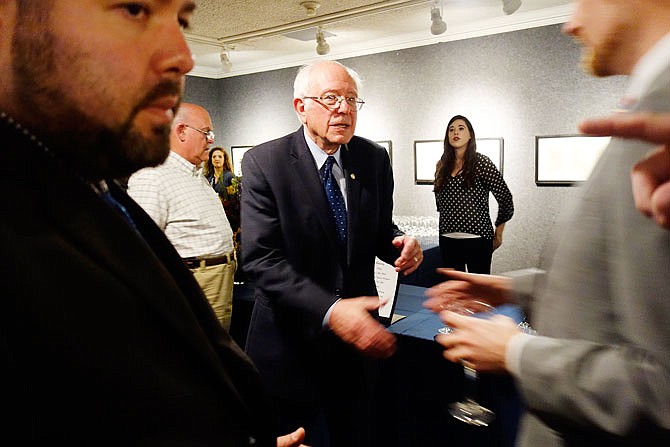Sen. Bernie Sanders didn't disappoint his supporters during a Thursday visit to Fulton to deliver the 58th Green Lecture at Westminster College.
The Vermont independent's lecture touched on many topics relating to foreign policy; he often connected the subject to domestic policy and in-country concerns.
He chided President Donald Trump on everything from his rhetoric and proposed foreign aid cuts to his handling of North Korea, Iran and terrorism. But Sanders also made clear an undue focus on American military might have began long before Trump's election.
"The goal is not for the United States to dominate the world. Nor on the other hand is our goal to withdraw from the international community and shirk our responsibilities under the banner of 'America First,'" Sanders said, invoking a phrase Trump has used to explain his approach to military and economic affairs on the global stage.
"Here is the bottom line," he concluded. "My view is the United States must seek partnership, not just between governments but between people."
This holistic viewpoint creates a grassroots level of governing and communication, he said, adding people must resist the forces that attempt to drive wedges between them.
"Every person on this planet shares a common humanity," he said. "We all want to live in peace. That is what being human is all about."
The senator delivered his remarks as Trump concluded a four-day visit to the United Nations, where he offered an aggressive stance that divides the world into friends and foes, with promises to meet America's enemies, particularly North Korea, with catastrophic force.
Sanders defended the United Nations and NATO - both targets of Trump's ire - as fundamental to international stability. "Dialogue and debate are far preferable to bombs, poison gas and war," he said.
Sanders blasted Trump's decision to withdraw from the Paris climate accord and said the president would make a similarly irresponsible mistake should he walk away from the multination Iran nuclear deal. He casted both moves as isolationist actions that would make the world less stable and more dangerous.
And he bemoaned proposals for increased defense spending and cuts in foreign aid, saying the latter will only yield conflicts that will require more military spending in the future.
However, at one point Thursday he added, "Yes, military force is sometimes necessary."
Speaking for about an hour, Sanders left the hall while the audience chanted "Bernie, Bernie, Bernie." The U.S. senator, a former and possibly future presidential candidate - though he would be 79 in 2020 - shook hands with students on his way out.
Rob Crouse, the college's director of media and public relations, relaxed in a wing chair following a private reception with Sanders in the National Churchill Museum. Crouse and others put weeks of work into logistics for incoming media, including dozens of national, regional and local reporters.
He said Sanders' speech was rousing.
"I've been here for 11 years and I've never heard such a reaction," Crouse said. "He has such an invigorating effect on people because his passion just comes across. This was a home run for Westminster."
Crouse said this also was a record for live-streamed events at the college.
Tim Riley, director and chief curator for the National Churchill Museum on the campus, said Sanders is now part of a long tradition of distinguished speakers at Westminster. Other notables include former British prime ministers Sir Winston Churchill and Lady Margaret Thatcher. Ralph Nader and Bob Geldof spoke at Westminster Green Lectures, as well as other world leaders including President Gerald Ford, Lech Walesa and Mikhail Gorbachev. The first speaker, in 1937, was Oscar D. Skelton, undersecretary for Foreign Affairs for the Dominion of Canada.
"Sen. Sanders certainly gave us a lot to think about," Riley said. "These words will resonate not only in this hall but throughout (the world)."
Riley presented Sanders with a framed, original ticket to the March 5, 1946, Green Lecture, during which Churchill presented his "Iron Curtain" speech. This lecture famously told the world about the potential threat of the Soviet Union.
Paul M. Robinette, a former NBC executive from Penn Valley, California, who worked for the "Today Show" and Johnny Carson, attended the lecture with his wife, Wendy Hornsby Robinette, author of the Maggie MacGowen mystery series and winner of the Edgar Award.
Related to former Vice President Joe Robinette Biden, Paul Robinette said politics run strong in their family.
"Bernie's positions are going to be definitely a driver, in part, of the conversations in both the 2018 and 2020 elections," he said. "I think the human rights element, as we go forward, will be more and more of an important part of the conversation. Foreign policy is going to take a different turn because of human rights issues and human rights issues."
The Associated Press contributed content to this article.

